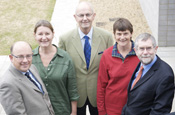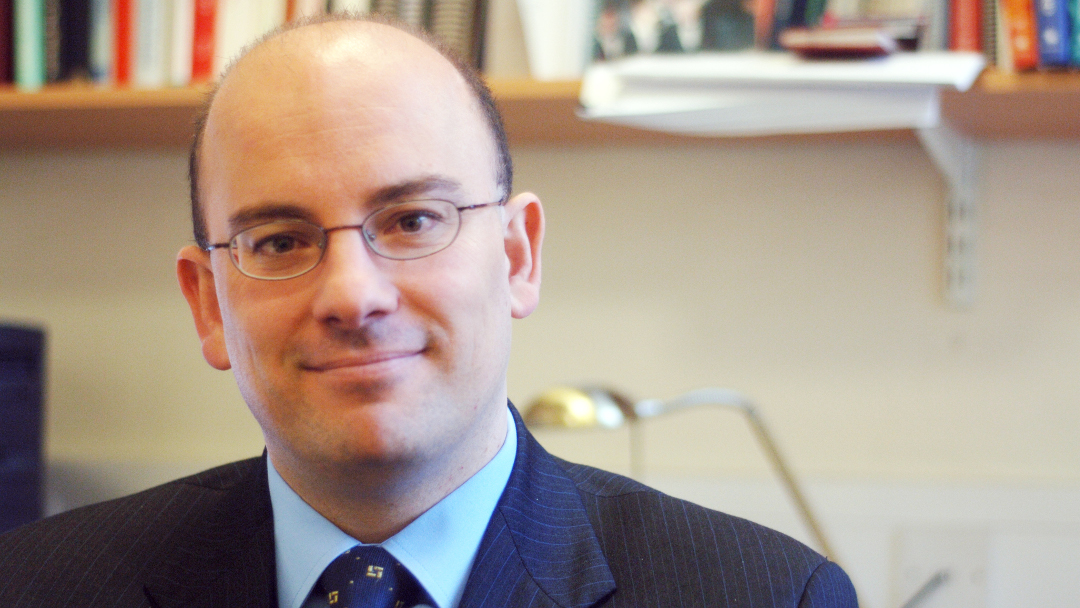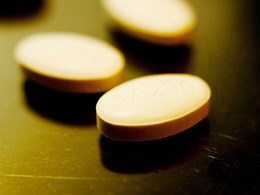 ICR’s abiraterone team: Professor Johann de Bono, Dr Florence Raynaud, Professor Mike Jarman, Dr Elaine Barrie and Professor Ian Judson
ICR’s abiraterone team: Professor Johann de Bono, Dr Florence Raynaud, Professor Mike Jarman, Dr Elaine Barrie and Professor Ian JudsonAbiraterone was designed and developed at The Institute of Cancer Research (ICR) and The Royal Marsden Hospital. First synthesised in the early 1990s, this year it completed the journey from an idea to life-extending treatment for men with advanced prostate cancer. The US Food and Drug administration (FDA) approved the use of abiraterone in men with castration resistant prostate cancer inApril 2011, and European approval followed in September 2011.
Abiraterone has not only led to improved survival in men with advanced prostate cancer but has also changed the way we think about this disease. Lead researchers Professor Mike Jarman, Dr Elaine Barrie, Professor Gerry Potter, Professor Ian Judson, Professor Johann de Bono and Dr Florence Raynaud were recognised with the Royal Society of Chemistry’s prestigious Teamwork and Innovation Award, announced in May 2011, for their contributions to developing this important treatment.
Learn more about the development of abiraterone
The beginnings
In 1941, clinician Dr Charles Huggins suggested that surgical castration (removing the testicles) would result in depletion of the male sex hormone, androgen, and the corresponding regression of prostate cancer. Huggins was awarded the 1966 Nobel Prize for Physiology or Medicine for the discovery that hormones could be used to control the spread of some cancers. His observation that prostate cancer is dependent on male hormones remains critically important.
Since this time, prostate cancer has been treated by medicines that prevent the production of male hormones from the testes. However, despite treatment, the disease eventually progresses and patients must move on to other types of treatment. Only a handful of other drugs exist to help patients at this stage and most are cytotoxic drugs that carry significant side-effects. The treatments may extend life for a few months on average, but then a patient’s only option becomes supportive care.
The concept
 Professor Mike Jarman
Professor Mike JarmanIn the 1990s, the ICR’s Professor Mike Jarman and colleagues Dr Elaine Barrie and Professor Gerry Potter, working in what is now the Cancer Research UK Cancer Therapeutics Unit, started to look for drugs that could shut off the production of the male sex hormone androgen. They reasoned that prostate cancers that became resistant to hormonal treatment were able to get androgens from elsewhere in the body to keep growing, including perhaps the tumour itself. If they could disrupt the synthesis of androgen perhaps they could develop a new treatment for the disease.
The team started with a drug called ketoconazole, which they noticed prevented the growth of prostate cancer cells. The drug worked by inhibiting an enzyme called CYP17, which is important in the production of male sex hormones. Ketoconazole is used in treating prostate cancer but research showed it was not very potent, not sufficiently specific and was quickly broken down by the body. The team felt they could develop a better drug and set out to design and develop new drugs that could inhibit the enzyme CYP17. Dr Barrie evaluated a number of compounds made within Professor Jarman’s team to work out how successfully and selectively they would inhibit CYP17, with the assistance of computerised models created by Professor Stephen Neidle, Dr Charles Laughton and colleagues that helped reveal how well the shapes of the molecules would fit together in three dimensions.
The search was rewarded when Professor Potter and Dr Barrie designed and evaluated a chemical called CB7598, filing for a patent in 1993. A year later the team published the first paper describing CB7598, which they called abiraterone. A paper followed describing the rationale behind the development of abiraterone and how it was synthesised. The drug specifically and irreversibly blocked an enzyme called CYP17. This enzyme is critical in the biological pathway that makes or synthesises sex hormones – androgen and oestrogen. Blocking this enzyme prevented androgen from being made – anywhere in the body.
Early studies
The next step for the ICR team was to turn the chemical they had designed into a medicine that could be taken by patients. Professor Mitch Dowsett, Dr Barrie and others were able to demonstrate in animal and cancer cell models that the drug worked as expected, blocking the synthesis of androgen and leading to a decrease in its levels in the body and in the size of androgen-dependent organs. These and other early studies were important as they showed that the drug was safe and effective and was ready to be evaluated in patients. Professor Potter and Dr Ian Hardcastle then scaled up the small amounts of the drug used in the lab into the quantity and purity suitable for patient use.
From 1996, early stage clinical trials in prostate cancer patients led by Professor Judson with pharmacodynamic studies carried out by Dr Florence Raynaud showed that abiraterone did hit the correct target and lower levels of male hormones.
However, early in the drug’s development concerns were raised about the possible side-effects of blocking CYP17. Preventing androgen from being made could lead to adrenal insufficiency – a potentially life-threatening complication. The developmental progress was further hampered by a lack of interest in hormone treatments for prostate cancer. Part of the problem lay in the name of late stage prostate cancer, which was often referred to as ‘refractory’ disease, implying that the cancer became resistant to androgens and could progress without them. Many scientists and clinicians argued that blocking androgen production at this late stage would be ineffective.
New passion
 Professor Johann de Bono
Professor Johann de BonoProfessor Johann de Bono joined the ICR from San Antonio, Texas, in 2003 with a passion for developing better cancer medicines for patients and an interest in prostate cancer. In 2004 he recognised the potential of abiraterone as a treatment for men with late stage advanced prostate cancer. He reasoned that late stage prostate cancer was not ‘hormone refractory’ but ‘castration resistant’, meaning that the tumour was still dependent on testosterone but was able to progress because it could get androgen from elsewhere – perhaps even from the prostate cancer itself. He also reasoned that adrendal insufficiency would not be an issue with abiraterone. Children born with an inherited deficiency of CYP17 (which abiraterone blocks) do not suffer from adrenal insufficiency so Professor de Bono felt that this potential side-effect would not occur. With support from a partnership with Cougar Pharmaceuticals – now a member of the Janssen Pharmaceutical Companies – Professor de Bono, Dr Gert Attard and colleagues began the first Phase I clinical trials to test safety and anti-tumour activity.
Success
The first Phase I study of abiraterone in patients with advanced prostate cancer was run by the ICR and the RMH. The small study involved 21 men and showed significant tumour shrinkage and dramatic falls in PSA levels in the majority of advanced prostate cancer patients who received abiraterone, as well as demonstrating the safety of the drug in humans.
Less than a year later, the results of a larger Phase I/II study were reported. This study of 54 patients confirmed the Phase I results, and showed that up to 70 per cent of men responded to abiraterone. About two-thirds of men experienced significant benefits for an average of eight months, with scans showing their tumours decreased in size and their PSA levels dropped substantially.
Unfortunately not all men responded to abiraterone and some experienced more benefit than others. The Phase I/II studies started to unravel the possible reasons for the differences in response. Researchers noticed that the majority of patients whose tumours shrank significantly had an abnormality of a gene called ERG that was probably driving their cancer.
Our scientists have developed a test for the ERG gene and are now conducting additional studies to determine which men are most likely to benefit from treatment with abiraterone.
What now?

Abiraterone (trade name Zytiga) has been licensed by the US Food and Drug Administration, meaning that prostate cancer patients in the US can now receive this drug. Cougar’s affiliate, Janssen Pharmaceutical Companies, has a pending application for a license to sell the drug in Europe.
Abiraterone has changed the way the science community looks at prostate cancer. The research showed that advanced prostate cancers are still dependent on the male hormone testosterone, and challenged conventional wisdom by proving that an anti-hormonal agent can still benefit men with this late-stage cancer. The research has led to a renaming of advanced prostate cancer, from ‘hormone refractory’, which implied that prostate cancer no longer needed male sex hormones to grow, to 'castration resistant'. This new name reflects that prostate cancer remains dependent on male hormones to grow, but that the hormones came from areas in the body outside the testes, including the tumour itself.
Professor Johann de Bono, who led the Phase I, II and III clinical trials, says: “Prostate cancer kills one man each hour in the UK. New therapies are desperately needed. Abiraterone acetate has been approved for men who are no longer responding to other drugs and so we are very pleased that this decision means they will have another treatment available to them.”
Thank you
This work is the result of many people’s dedication and support over more than two decades. Along the way, research and clinical studies for the development of abiraterone have been supported (in no particular order) by Cancer Research UK, BTG International LTD, Cougar Biotechnology Inc. / Janssen Pharmaceutical Companies, the Medical Research Council (MRC), Experimental Cancer Medicine Centre, Prostate Cancer Research Foundation, The Prostate Cancer Charity, the Prostate Cancer Foundation (USA), the ICR and RMH.
The painstaking work is the result of a team of dedicated scientists and clinicians at the ICR, The Royal Marsden and internationally. The work shows how by understanding the biology of cancer cells, new ideas and new treatments can be created.
The most important thank you goes to the patients at The Royal Marsden and around the world that have taken part in the clinical studies of abiraterone, without which the development of this drug would not be possible.